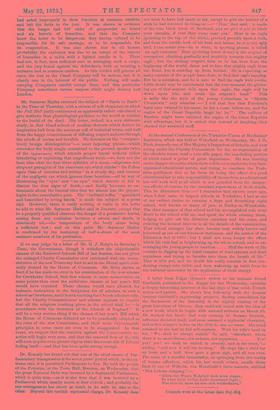A letter from Edgar Quinet's widow to his intimate friend
Garibaldi, published in the Rappel for last Wednesday, contains a deeply interesting account of the last days of that noble French writer and patriot. She shows him following with the deepest interest Garibaldi's engineering projects, finding consolation for the discussions of the Assembly in the nightly reading of the great historians of Greece, then suddenly seized with the idea of a new work, which he began with unusual arduour on March 20. He worked too hard ; that very evening he became feverish, influenza declared itself, and soon assumed a typhoidal character, and at five minutes to five on the 27th he was no more. His mind retained to the last its full self-mastery. With his wife's hand in his, " We shall be always united," he said, "elsewhere, where there is no more disease, nor sadness, nor separation Yes yes ! yes ! we shall be united in eternity, and in the truth,"— adding, "and now I will try to sleep." He slept like a child for an hour and a half, then gave a great sigh, and all was over. The sense of a needful immortality, as springing from the reality of human affection, which his last words evince, recalls those lines of one of Wilhelm von Humboldt's three sonnets, entitled "Des Lebens Ausgang":- "Allein der Wesen Wahrheit doch muss siegen ;
Es kann nicht heil'ge Liebe tauschend 1iigen ; Was eine ist, muss ale sins rich wiederlinden."


































 Previous page
Previous page